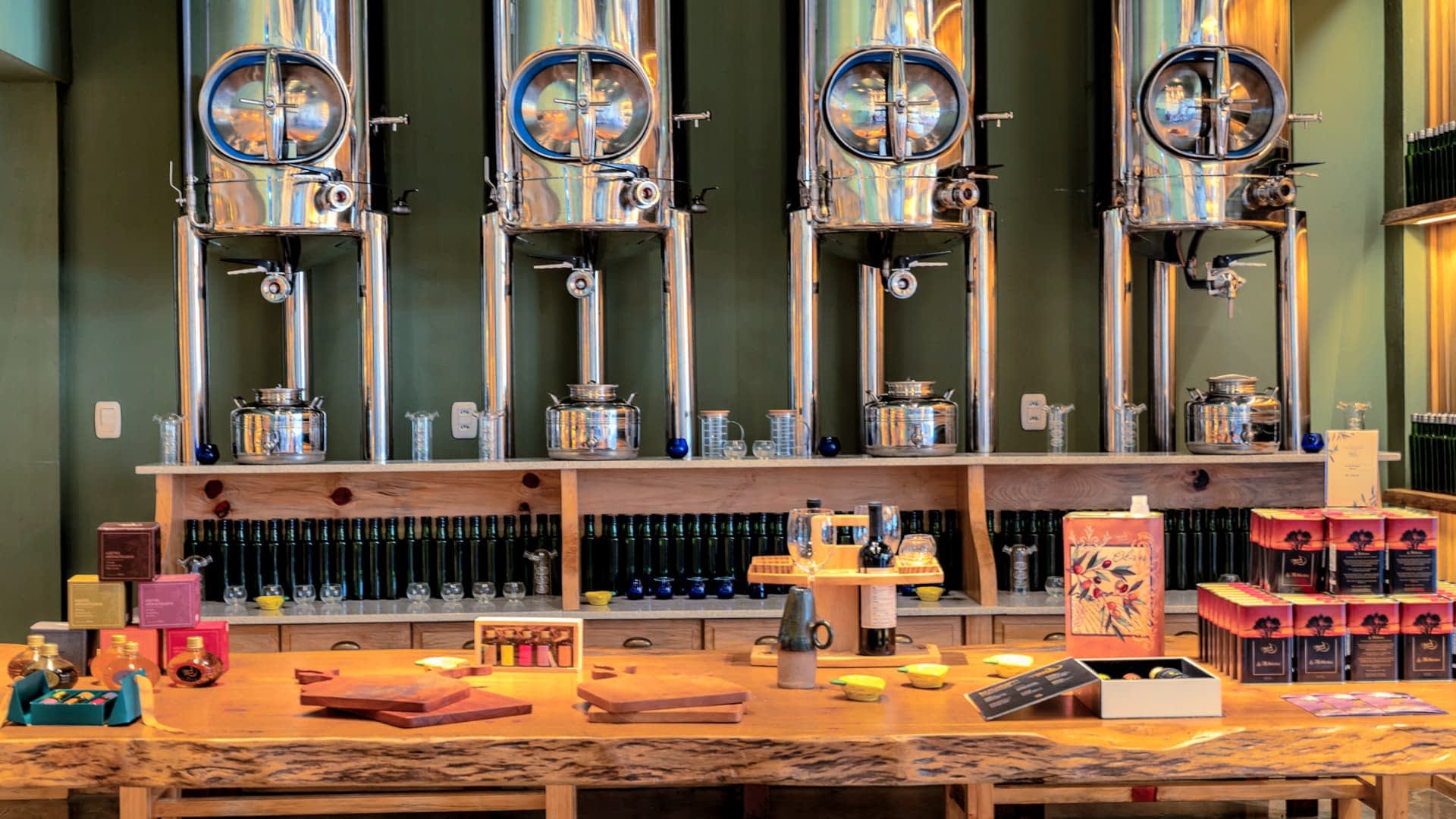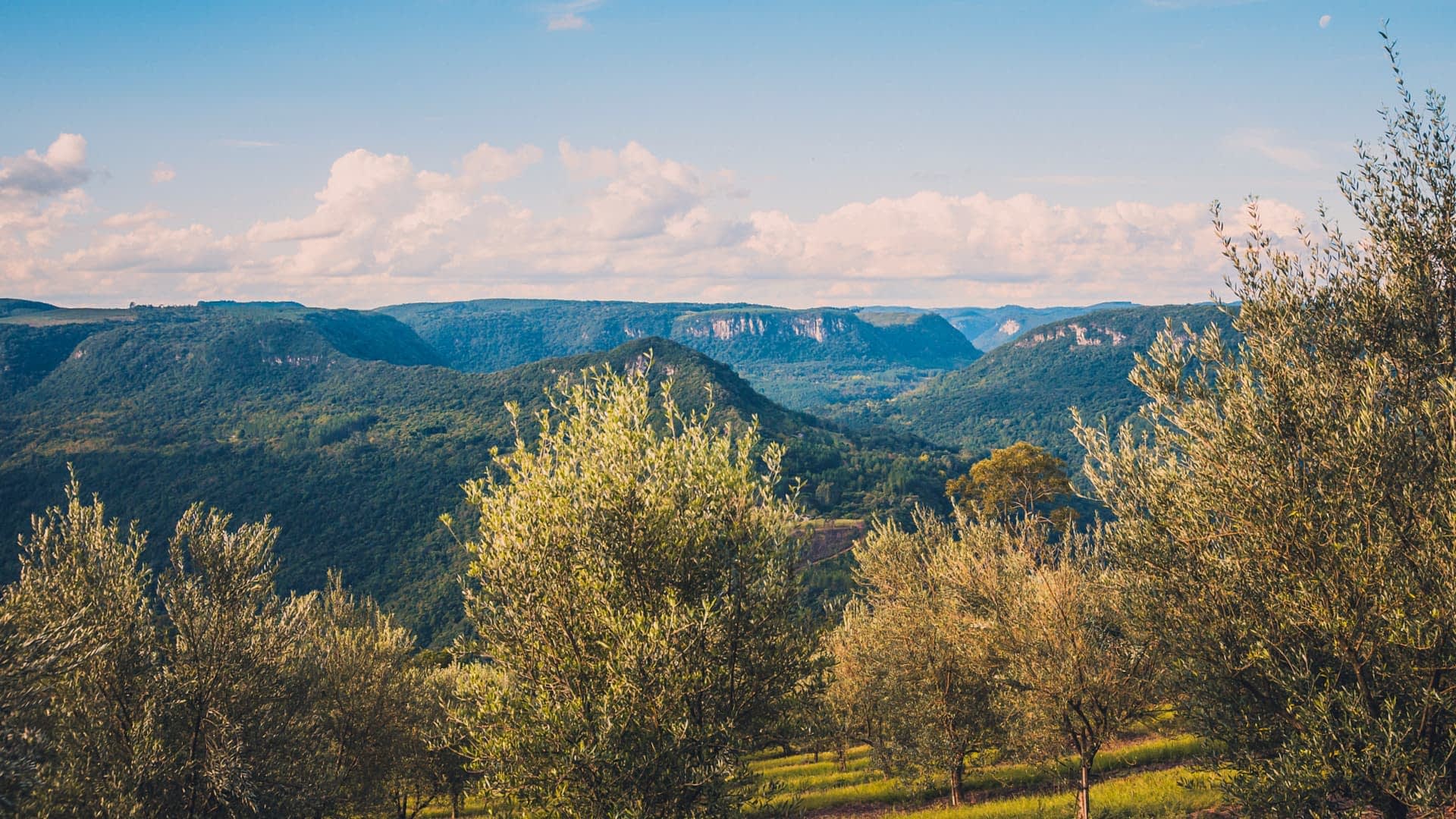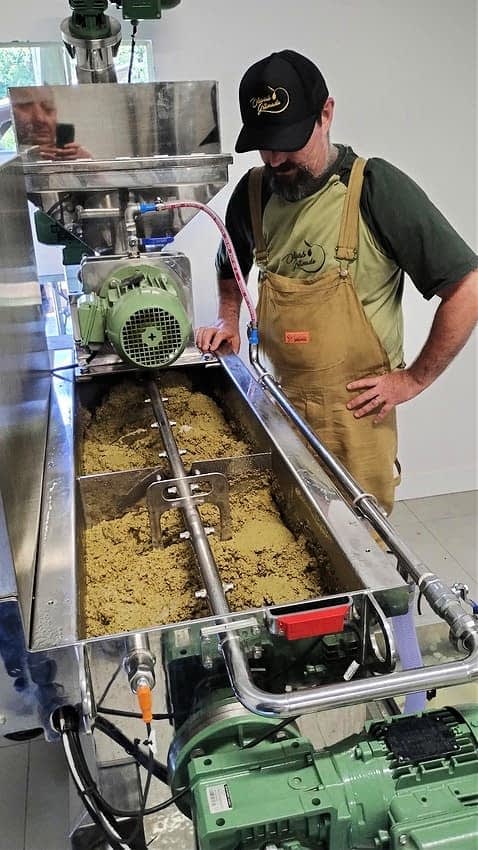Summary
Olivas do Gramado, a park in Rio Grande do Sul, Brazil, has become known for its award-winning extra virgin olive oil produced from thousands of olive trees. The park offers a variety of activities for visitors, including tastings, tours, and events like the olive harvest. Despite challenges like weather disruptions and diseases affecting olive trees, the park continues to invest in sustainability and expansion.
Nestled in the heart of the southernmost Brazilian state of Rio Grande do Sul, a vast park dedicated to nature and olive trees has emerged as the source of award-winning extra virgin olive oil.
Spanning dozens of hectares, the park is home to a diverse array of plants and animals alongside thousands of olive trees. Each year, hundreds of thousands of visitors marvel at its natural splendor.
Parque Olivas do Gramado rests in the lush green hills of the Caí River region, about two hours north of Porto Alegre. Officially opened to visitors six years ago, the olive park is rooted in a rich family tradition.
See Also:After Devastating Year, Brazilian Producers Defy Odds
“The park celebrated its sixth anniversary in December,” said André Bertolucci, co-owner of Olivas do Gramado. “However, the groundwork, including tourist infrastructure, access roads, olive groves, machinery and equipment, was laid in the mid-2010s, when the first investments were made on our family property to fulfill a grand dream.”
Since 2023, Olivas do Gramado has earned two Silver Awards at consecutive NYIOOC World Olive Oil Competition editions for its delicate blend of Arbequina, Picual, Frantoio, Koroneiki, Ascolana and Manzanilla olives.
The family drew upon the expertise of patriarch Pedro Bertolucci, who had been promoting tourism in Brazil since the 1980s.
“Together with my siblings Paula and Daniel, and our late mother Susana Bertolucci, we visited olive groves in countries like Portugal, Spain and Italy, and observed that olive cultivation in Brazil was still in its early stages,” Bertolucci said.
It was then that oleotourism became the driving force behind a new project.
 Among the tourism offerigns at Olivas do Gramado is the opportunity for visitors to create their own olive oil blends. (Photo: Olivas do Gramado)
Among the tourism offerigns at Olivas do Gramado is the opportunity for visitors to create their own olive oil blends. (Photo: Olivas do Gramado)
“We saw a unique opportunity to share the fascinating process of producing high-quality extra virgin olive oil with Brazilians, enhanced by a range of gastronomic, adventurous, contemplative and entertaining experiences that now form the core of activities at Olivas do Gramado,” Bertolucci said.
“At the park, visitors can join the sensory harmonized tasting, sampling up to seven different olive oils and aromatic infusions, each paired with specific foods,” he added. “During daily presentations held across five sessions in our 40-seat auditorium, our sommeliers conduct mini-classes on olive oil, addressing topics such as harvesting, extraction, sensory attributes, fraud, chemical analysis and an introduction to sensory evaluation.”
The Bertolucci family also invested in a tourist train, the Olivas Express, that travels through the olive grove while a tour guide describes planting, olive grove management and the harvest.
“In February and March, we host an event called Nostra Oliva, where visitors take part in the olive harvest and oil extraction, even bottling their own liquid gold,” Bertolucci said.
“The day concludes with a sunset view over the canyons, featuring guest DJs, a lavish antipasti spread, and, of course, our freshly made unfiltered olio nuovo,” he added.
According to Bertolucci, Olivas do Gramado attracts 250,000 visitors annually, benefiting from its location in a popular local tourist destination.
 Its owner estimates that a quarter of a million people visit Olivas do Gramado annually to learn about olive oil and enjoy the picturesque scenery. (Photo: Olivas do Gramado)
Its owner estimates that a quarter of a million people visit Olivas do Gramado annually to learn about olive oil and enjoy the picturesque scenery. (Photo: Olivas do Gramado)
“Set within the Atlantic Forest and offering breathtaking views of the Pedras Brancas canyons in Gramado’s countryside, an area shaped by Italian-German colonization in the Hortênsias region of Rio Grande do Sul, this dream became a reality,” Bertolucci said.
Olivas do Gramado cultivates 29 hectares of olive groves with approximately 12,600 olive trees, including Arbequina, Koroneiki, Ascolana and Manzanilla. Additional Spanish, Greek and Italian varieties are also grown across the property.
Most of the olive trees are around 10 years old, some younger. As these trees mature, the company anticipates a substantial increase in olive yields.
Selecting the appropriate cultivars has been essential to the success of the project.
“We learned a great deal from Uruguay, particularly from the Uruguayan Olive Association (Asolur) and the faculty of chemistry at the University of the Uruguayan Republic,” Bertolucci said.
“Uruguay has a long history of olive cultivation in South America and serves as an excellent reference for Brazilian olive farming due to the similarities in terroirs,” he added. “This greatly helped us select the varieties best suited to our soil in the Serra Gaúcha.”
According to Bertolucci, environmental preservation is one of the core principles of Brazilian olive cultivation.
“At Olivas do Gramado, all riparian forests are completely preserved, providing protection for the grove against fungi, aphids, scale insects and other diseases that could affect the olive trees,” he said.
“A large portion of the tourist infrastructure is powered by a photovoltaic plant, which uses solar panels to generate green energy for the mill, laboratory, store and restaurant,” Bertolucci added.
Furthermore, the company sources its water from springs and artesian wells. Olivas do Gramado also places great importance on waste treatment.
 Heavy rain during the previous spring resutled in a small harvest and historically low olive oil production across Rio Grande do Sul. (Photo: Olivas do Gramado)
Heavy rain during the previous spring resutled in a small harvest and historically low olive oil production across Rio Grande do Sul. (Photo: Olivas do Gramado)
“All organic waste from the restaurants is composted and later used as fertilizer for the olive groves and organic gardens,” Bertolucci said. “Non-organic waste, such as cardboard, aluminum, and plastic, is collected, sorted, and stored in containers before being sent for recycling.”
“The proceeds from selling these materials are reinvested to maintain trash bins and containers, tourist signage and environmental education for our staff,” he added.
The company also runs an effluent treatment plant, described by Bertolucci as “state-of-the-art.” The plant converts wastewater into gray water used for outdoor cleaning.
“Additionally, over 49 hectares of permanent preservation areas guarantee the full preservation of the region’s flora and fauna,” he said.
According to Bertolucci, olive growers in the Serra Gaúcha region face two major challenges, including the acidic basaltic soil, which has a high aluminum content and requires regular liming.
“The second challenge is the steep terrain, which makes the installation of shade nets and harvesting more difficult,” Bertolucci noted.
Despite significant investments over the years, careful planning, and good agricultural practices, growers in the region remain vulnerable to the increasing unpredictability of the weather.
“In 2023, heavy rains from September to August disrupted the flowering, pollination, and fertilization stages of olive trees in southern Brazil,” Bertolucci recalled. “Only a few producers had successful harvests in 2024, which was disappointing. The official 2024 harvest opening was held at Olivas do Gramado, as our microclimate shielded us from the severe impacts faced by most Gaúcho producers.”
“In May 2024, however, we faced the largest climatic tragedy in the country’s history. Torrential rains caused flooding, landslides, and infrastructure damage, including at our property, where the main access road was destroyed,” he added. “We had to open a secondary road and make significant investments to repair the damaged one.”
“Despite these setbacks, we reopened the main access road this December and faced no major issues with the tourist facilities, mill or olive grove,” Bertolucci continued.
Other challenges stem from diseases that can afflict olive trees.
“In Serra Gaúcha, high humidity levels and frequent fog necessitate careful monitoring of fungi, which spread easily in this environment,” Bertolucci explained. “Other diseases, such as scale insects, aphids, and whiteflies, are less common. To keep our olive grove healthy, we use regulated fungicides and insecticides to protect the trees.”
“We are currently testing organic products from Poland on sections of our olive grove to evaluate the possibility of transitioning to an organic cultivation system in the future,” he added.
The next step involves further expansion, with six additional hectares of olive trees set to begin production soon.

